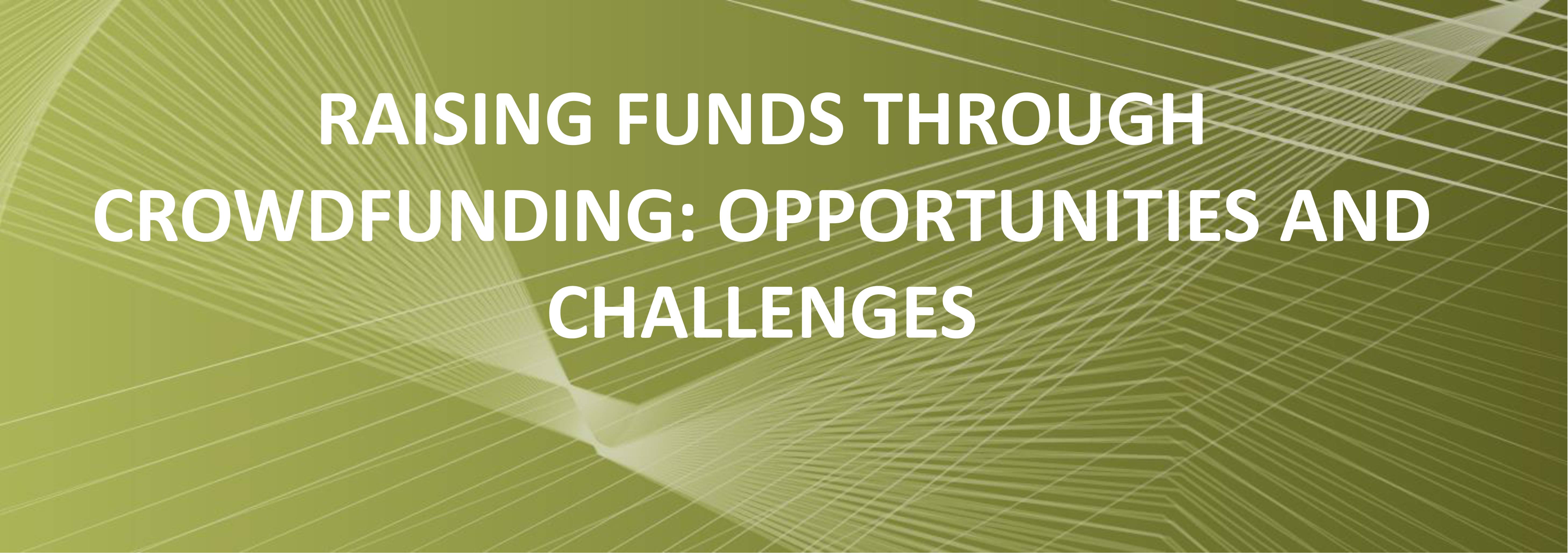- RAISING FUNDS THROUGH CROWDFUNDING: OPPORTUNITIES AND CHALLENGES

RAISING FUNDS THROUGH CROWDFUNDING: OPPORTUNITIES AND CHALLENGES
Crowdfunding is the practice of raising finance through a large number of persons who individually contribute relatively small amounts of money to support a business venture, or projects across various fields. Typically carried out through internet platforms and social media, crowdfunding has been gaining ground through the existence of an expanding digital ecosystem facilitating connectivity and digital fund transfers.
Types of crowdfunding
- Donation crowdfunding: Crowd funders make a donation to the project or venture without receiving anything in return.
- Rewards crowdfunding: Crowd funders receive a non-financial reward in return for the funds contributed. Equity is not diluted and the funds received do not need to be repaid.
- Debt crowdfunding: The types of lending vary and include peer-to-peer lending, mini-bonds, and invoice financing. The actual rate of interest would depend on the lending terms, the perceived riskiness, and the bids received.
- Equity crowdfunding: The crowd funders receive equity interest in the business in return for their contribution. Equity crowdfunding is often used by start-ups without a business track record, or the ability to make loan and interest repayments in the short term, while allowing investors to share in future growth potential.
Advantages of crowdfunding
- Fast and cost-efficient means of raising funds for many start-up businesses and SMEs due to rapid access to a large pool of potential supporters from around the world.
- With a potentially large number of backers each contributing a relatively small sum, the risks are spread.
- Crowdfunding initiators would normally showcase their ideas and products to a large audience, allowing for early feedback on the existence of a market for those products.
- Crowdfunding creates a forum where businesses may engage with their audiences, raising product and brand awareness.
- As a focus group, potential backers may be useful in product and market development.
- Crowdfunding platforms may assist businesses in sourcing anchor investors, which would in turn raise awareness and increase the popularity of the fund raising among other investors.
- The ability to demonstrate an audience and a market for the product may facilitate fund raising from other sources and reduce costs of capital.
- The emergence of secondary markets for an increasing number of crowdfunded securities have increased the liquidity of those securities, providing opportunities for investors to make an early return on their investments, while facilitating an update in their portfolios.
Suitability of crowdfunding
- Crowdfunding is more suited to businesses whose products are easier to understand for the crowdfunding audience. Crowdfunding campaigns featuring projects with very high capital needs, long development timescales, or radical innovation may result in less favorable funding outcomes.
- Raising funds through a crowdfunding campaign would require creators to reveal their product to the public at a relatively early stage of development, leading to the risk that their intellectual property may be copied by competitors.
- Crowdfunding requires that creators communicate widely with their backers who follow the progress or lack of progress of a project. This may be time-consuming.
- Research has shown that a significant number of investors on crowdfunding platforms do not perform a proper assessment of risks or seek professional investment advice. Should the venture not be successful, there would be a need to manage communications with a broad range of disappointed investors in order to avoid reputational risks.
- Crowdfunding activities operate in a regulatory limbo in many countries. There is often a lack of clarity regarding the due diligence carried out by online crowdfunding platforms with regard to the risks of identity theft and money laundering. Raising funds through reputable platforms may however mitigate those risks.
Rapid pace of growth
According to the Massolution Global Crowdfunding Report, the amount of funds raised worldwide through crowdfunding is anticipated to reach USD 300 billion by 2025. Crowdfunding has now become an attractive source of alternative finance for many entrepreneurs, contributing to inclusive development, and providing a wider pool of investors with exposure to potentially lucrative start-up opportunities.
DTOS provides valuable insights and value-added services to businesses with regard to their evolving present and future needs. Should you have any query in relation to the topic covered and require any assistance, please do not hesitate to contact us. We shall be pleased to assist you.
Fred Yeung Sik Yuen CPA FCCA CGMA MBA
N.B: This is an updated version dated 19 October 2020

